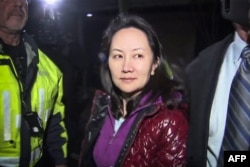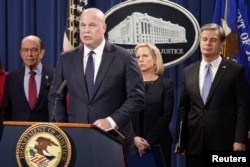Leaders from the United States and China will meet in Washington, DC this week to try to decrease trade tensions between the two countries. But the talks are complicated by a dispute about the Chinese technology company Huawei.
On Monday, the government of U.S. President Donald Trump announced criminal charges against Huawei. American government lawyers say the company has violated U.S. restrictions against sales to Iran.
In addition, they say Huawei stole trade secrets from the American company, T-Mobile. They say Huawei engineers secretly took photos of a robot made by T-Mobile and tried to take part of it from T-Mobile’s lab.
Huawei says it settled the dispute with T-Mobile in 2017.
American government lawyers have also charged Huawei’s chief financial officer Meng Wanzhou. Meng is being held in Canada, where she was arrested in December.
Even with these conflicts, observers say the trade talks would likely continue. However, they warn the Huawei issue may mean the sides may not reach any serious agreement.
If they do not come to any official understanding before March 1, the U.S. will sharply increase taxes on $200 billion worth of Chinese imports.
China answers
The Chinese foreign ministry has called on the U.S. to end its campaign against Huawei and other Chinese companies, calling the actions “unreasonable.”
Huawei also rejects the U.S. charges. The company is one of the world’s biggest providers of phone and Internet equipment; half of its sales come from outside China. For the past 10 years, the company has denied U.S. accusations that its equipment could permit it to spy for China. It says the U.S. has no evidence to support the accusations.
U.S. concerns
On the U.S. side, the Huawei charges show some officials’ and business leaders’ main objections to Chinese actions. They argue that Chinese industries require U.S. and other foreign companies to share technology in exchange for access to Chinese buyers. They also say that Chinese industry insiders sometimes steal information.
Robert Lighthizer is the U.S. trade representative and the lead negotiator in this week’s talks. He wants China to strengthen its protections of intellectual property. He also wants it to stop unfairly supporting state-owned businesses.
But in earlier talks, Chinese officials have not shown any interest in accepting U.S. demands. Chinese officials deny the claim that they force U.S. companies to share technology. And they say supporting their state-owned companies and gaining new technology is critical to China’s economic development.
What about trade?
U.S. officials say the dispute over Huawei and other Chinese businesses is separate from the trade issues to be discussed this week.
Chinese officials have already offered to buy more from the U.S. and open more industries to U.S. companies. In return, they may ask the U.S. to remove the taxes that Trump place on some Chinese products last year.
Derek Scissors, a China expert at the American Enterprise Institute, commented on the idea. He said China would likely accept such a deal, if it were offered.
“If they think they can get the deal that they want, they won’t cancel the talks over Huawei,” he said.
I’m Caty Weaver.
Kelly Jean Kelly wrote this story for Learning English based on reports from AP and Reuters. Caty Weaver was the editor.
_______________________________________________________________
Words in This Story
complicate - v. to make something more difficult
access - n. permission or the right to enter, get near, or make use of something
intellectual property [rights] - n. the rights of a person who has thought of or invented something that other people want to use or profit from







